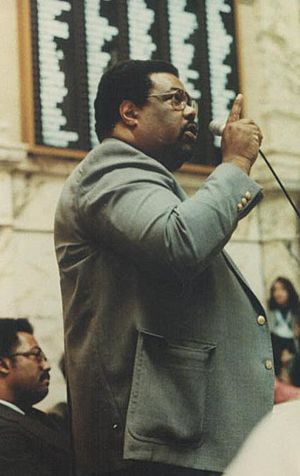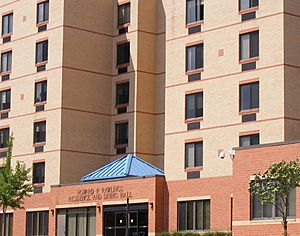Pete Rawlings facts for kids
Quick facts for kids
Pete Rawlings
|
|
|---|---|

Rawlings in 1990
|
|
| Member of the Maryland House of Delegates from the 40th district |
|
| In office January 10, 1979 – November 14, 2003 |
|
| Preceded by | Lloyal Randolph |
| Succeeded by | Marshall Goodwin |
| Constituency | Baltimore City |
| Personal details | |
| Born |
Howard Peters Rawlings
March 17, 1937 Baltimore, Maryland |
| Died | November 14, 2003 (aged 66) Baltimore, Maryland, U.S. |
| Political party | Democratic |
| Spouse | Nina Cole |
| Children | 3 children (including Stephanie) |
| Residences | Baltimore, Maryland, U.S. |
| Occupation | Teacher, mentor |
Howard Peters "Pete" Rawlings (March 17, 1937 – November 14, 2003) was an important American politician. He made history as the first African American to lead the powerful Appropriations Committee in the Maryland House of Delegates. This committee helps decide how the state's money is spent.
Rawlings represented the 40th legislative district in Baltimore, Maryland. He served in this role from 1979 until he passed away in 2003. His daughter, Stephanie Rawlings-Blake, later became the Mayor of Baltimore.
Contents
Early Life and Education
Pete Rawlings was born in Baltimore on March 17, 1937. His parents were Howard Toussaint Rawlings and Beatrice (Peters) Rawlings. His father worked hard as a custodian and then for the U.S. Postal Service. Pete grew up in public housing with his five brothers and sisters.
He went to Douglass High School. At that time, it was one of only three schools African Americans could attend before the Brown v. Board of Education Supreme Court decision. This decision made segregation in schools illegal.
Rawlings continued his education at Morgan State College, where he earned a degree in mathematics. He then got a master's degree in mathematics from the University of Wisconsin–Madison. He also did advanced studies at the University of Maryland. From 1969 to 1972, he taught mathematics at the University of Maryland, Baltimore County (UMBC). While at UMBC, he was a leader in groups that supported Black faculty and staff.
A Career in Maryland Politics
Delegate Rawlings served in Maryland's House of Delegates for many years. He was a member from January 10, 1979, until his death in 2003. In 1992, he became the chairman of the Appropriations Committee. This was a very important job.
As chairman, Delegate Rawlings became known for being honest and dedicated to his city. He had a deep understanding of the state's budget. He worked hard to improve public schools in inner-city areas. He pushed Baltimore school officials to be responsible for how they spent money and for student progress.
He also helped create a law that stopped racial profiling in Maryland. This means police could not stop people just because of their race. He also helped get money for the Reginald F. Lewis Museum of Maryland African American History & Culture. This museum celebrates the history and culture of African Americans in Maryland.
Political Influence in Baltimore
In 1999, Baltimore's mayor, Kurt Schmoke, decided not to run for re-election. Delegate Rawlings played a big part in finding the city's next leader. He first tried to convince NAACP president Kweisi Mfume to run, but Mfume said no.
Then, Rawlings decided to support Baltimore City Council member Martin O'Malley for mayor. This was a brave choice. O'Malley is white, and he was running against two African-American candidates in a city where most people were African-American. Rawlings, who was also African-American, believed O'Malley was the right person for the job.
Personal Life
Pete Rawlings was married to Nina Cole. They had three children together: Wendell, Lisa, and Stephanie.
Lasting Legacy
Just before he passed away, Rawlings was honored as the national education Policy Leader of the Year. This award came from the National Association of State Boards of Education (NASBE). Brenda Welburn, a leader at NASBE, said that Delegate Rawlings was a "champion" for all students in Maryland. She praised him for demanding better results from the education system and for working to close the achievement gap for minority students.
Delegate Rawlings passed away from cancer on November 14, 2003. Two days later, the Baltimore Sun newspaper wrote an article about him. It said he was an "extraordinarily gifted leader" and one of the most successful politicians of his time. They described him as someone known for both being careful with money and having a caring heart.
After his death, the Maryland Senate gave him the First Citizen Award. To honor him, the Howard Peters Rawlings Conservatory and Botanic Gardens of Baltimore and the Howard P. Rawlings Residence and Dining Hall at Morgan State University were named after him.
Congressman Elijah Cummings, another important political figure, said this about Pete Rawlings: "A politician worries about the next election. A true statesman worries about the next generation, and children yet unborn, and that was Pete Rawlings."
His daughter, Stephanie Rawlings-Blake, became the Mayor of Baltimore in 2010.
The Rawlings Undergraduate Leadership Fellows program at the University of Maryland School of Public Policy is also named in his honor. This program helps college students learn about leadership and how to speak up for important causes.
 | Laphonza Butler |
 | Daisy Bates |
 | Elizabeth Piper Ensley |


